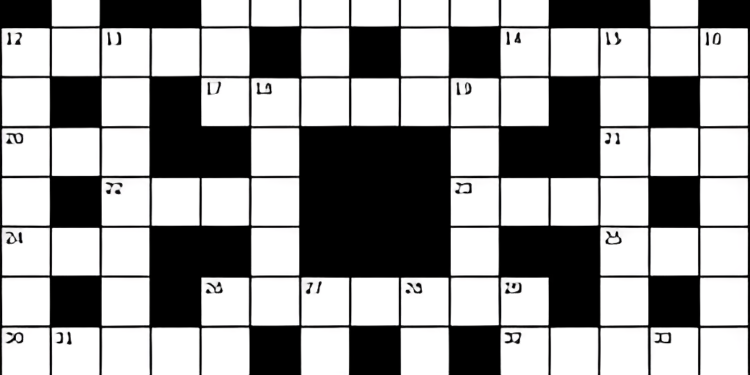Introduction lead in to lingo Crosswords – Crossword puzzles stand as a beloved brain teaser, tracing their origins back to the early 20th century. These puzzles challenge players to fill in a grid of white and black squares with words that intersect at common letters, based on clues provided. Their enduring popularity lies not only in the mental exercise they offer but also in their ability to expand vocabulary and knowledge across a multitude of subjects.
Contents
- 1 Understanding lead in to lingo in Crosswords
- 2 Related posts
- 3 Deepika Delivers a Baby Girl, Joyful News for the Actress and Family
- 4 Shahid Kapoor Wraps Up Shooting for ‘Deva
- 5 Lenz’s Ex: Bethany’s Happiness upon Meeting Michael Galeotti
- 6 The Making of “Hum Aapke Hain Koun”
- 7 The British IPTV Service in the UK
- 8 How to Pursue Comedy Professionally: A Comprehensive Guide
- 9 Chainiste Decentralised Innovation
- 10 The Role of lingo in Crossword Clues
- 11 Lingo Crossword Clues: Examples and Analysis
- 12 Strategies for Solving Lingo Crosswords
- 13 Challenges and Rewards of lead in to lingo Crosswords
- 14 Conclusion: The Joy of lead in to lingo Crosswords
- 15 FAQs on Lead-In to Lingo Crosswords
Understanding lead in to lingo in Crosswords
Lingo, in the context of crosswords, refers to the specialized vocabulary or jargon that is specific to a particular field or interest group. From science and technology to art and literature, each area has its own set of terms that can appear in crossword puzzles. Grasping this specialized language is crucial for puzzle solvers, as it often holds the key to unlocking the answers to challenging clues.
The Role of lingo in Crossword Clues
Crossword clues often incorporate lingo to provide hints that are both cryptic and thematic. Solvers must navigate through the specific vocabulary to understand what is being asked. The use of lingo not only tests a player’s knowledge but also encourages learning and curiosity about different subjects. Strategies for deciphering these clues include looking for contextual hints and leveraging known lingo to infer the answers.
Lingo Crossword Clues: Examples and Analysis
Consider a clue like “Einstein’s realm (abbr.)” with the answer being “PHY” for physics. This example demonstrates how familiarity with the lingo of science can lead directly to the solution. Another clue might be “Java or Python,” to which the answer is “LANG” (short for language), showcasing how understanding tech lingo is essential. These examples illustrate the diversity of knowledge and vocabulary required to excel in solving crossword puzzles.
Strategies for Solving Lingo Crosswords
Expanding one’s lingo vocabulary is a strategic approach to mastering crosswords. Engaging with literature, news articles, and educational content across various fields can enhance one’s ability to decipher crossword clues. Additionally, playing word games and participating in online forums dedicated to crossword solving can offer practice and exposure to different types of lingo.
Challenges and Rewards of lead in to lingo Crosswords
Lingo crosswords present a unique challenge due to the specific knowledge required to solve them. They can be daunting for beginners but also serve as a motivating factor to learn and explore new areas of knowledge. The satisfaction derived from solving these puzzles is immense, offering a sense of achievement and intellectual growth.
Conclusion: The Joy of lead in to lingo Crosswords
Crossword puzzles, especially those rich in specialized lingo, provide a wonderful opportunity for mental exercise and learning. They encourage solvers to broaden their horizons and dive deeper into the vast world of vocabulary and knowledge. Starting with simpler puzzles and gradually tackling more complex ones can lead to a rewarding journey of discovery and intellectual enrichment. Whether you’re a seasoned solver or new to the world of crosswords, the adventure of unraveling the mysteries behind lingo-filled clues awaits.
FAQs on Lead-In to Lingo Crosswords
1. What are Lingo Crosswords?
Lingo Crosswords are a unique blend of crossword puzzles and the game of Lingo. They combine the word-finding challenge of crosswords with the letter-guessing fun of Lingo, requiring players to fill in the crossword grid by guessing the correct words based on given clues and the Lingo rules of letter positioning.
2. How do I play Lingo Crosswords?
To play Lingo Crosswords, you start with a crossword grid that has some letters already filled in. You’ll receive clues for the words that need to be completed. Your goal is to guess the words correctly, keeping in mind that like in Lingo, correct letters in the right position will be highlighted. Incorrect guesses may give you additional hints based on the letters’ correctness and position.
3. What makes Lingo Crosswords different from regular crosswords?
The primary difference is the integration of the Lingo game mechanics, where players must use logic and vocabulary skills to guess words with limited clues, and the correct positioning of letters is crucial. This adds an extra layer of challenge and engagement beyond traditional crossword puzzles.
4. Can beginners play Lingo Crosswords, or is it only for experienced players?
Lingo Crosswords are designed for players of all skill levels. Beginners can start with simpler puzzles to get accustomed to the format, while experienced players can challenge themselves with more complex puzzles. The gradual learning curve makes it accessible and enjoyable for everyone.
5. Are there any strategies to improve at Lingo Crosswords?
Yes, like with any game, there are strategies to improve:
- Start with the clues you find easiest to build a foundation.
- Pay attention to the letters that are confirmed to be in the correct position, as they can guide you in guessing adjacent words.
- Expand your vocabulary as a broader range of known words increases your chance of guessing correctly.
- Practice regularly to become familiar with common words used in Lingo Crosswords.


















